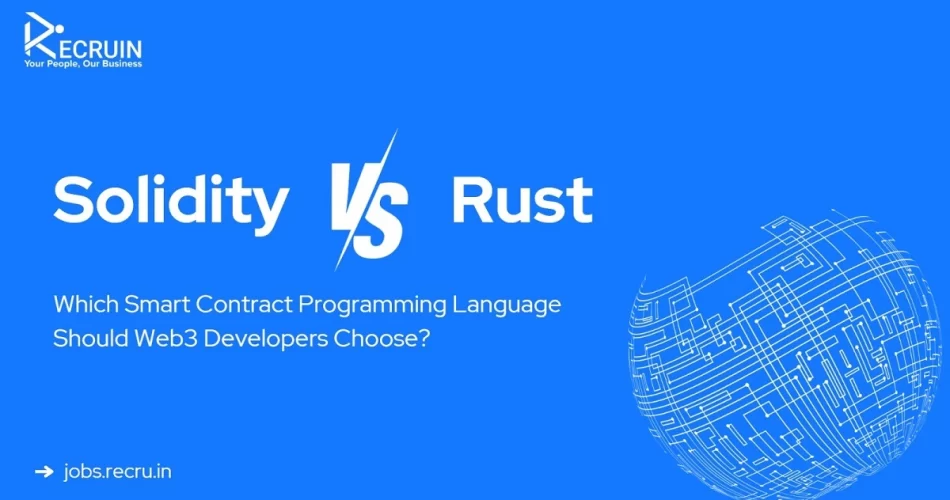What are Smart Contracts
Ever wondered about smart contracts and why are they gaining so much popularity in today’s world? They’re like digital wizards in the blockchain development realm, conjuring up agreements that execute themselves with the help of predefined set of rules. Think of it as having a digital assistant who not only understands the rules but enforces them – all by itself. Pretty cool, right?
Now let us break it down with an example.. Imagine you’re buying a virtual masterpiece. Normally, you’d need lawyers and banks to keep everyone honest. But with a smart contract, it’s like having a trusty robot referee. You set the game rules in code, and when the time’s right – like when you officially own that masterpiece – the contract springs to life and does its thing. It’s like magic, but with code.
Here’s the exciting bit: these smart contracts live on the blockchain industry. It’s like a super-secure digital diary that no one can mess with. Once a smart contract starts rolling, it’s locked and loaded, resistant to any funny business.
But how does this enchanting process work, and where do the programming languages like Solidity and Rust fit? Solidity and Rust are the two main programming languages used by web3 developers to build web3 applications on Ethereum Virtual Machine compatible blockchains and Solana respectively. They’re the coding artists who write the spells (code) for these smart contracts. Let’s dive in!
Solidity: Your Ethereum Companion
Solidity was created by one of the founders of Ethereum namely Gavin Woods. In August 2014 they began the research and started the development of Solidity shortly after that.
Engineered exclusively for Ethereum smart contract creation, Solidity parallels JavaScript, rendering it accessible to developers acquainted with web development. Solidity is designed to run on the Ethereum Virtual Machine (EVM). Its intrinsic support for varied data types, encompassing integers, strings, and arrays, expedites contract construction. Moreover, Solidity incorporates Ether-based transactions, streamlining financial operations. Yet, its prevalence exposes it to vulnerabilities, necessitating stringent security measures to preclude potential breaches.
Rust: The Guardian of Code Safes
Rust, a versatile language renowned for its performance and security attributes created by Mozilla in 2010, extends its utility to smart contract development. Notable for its robust concurrency support and memory safety through an innovative ownership system, Rust shines in applications demanding resilience and high-speed execution. The learning curve, albeit steeper compared to Solidity, is offset by Rust’s potential to mitigate memory-related errors, thus elevating contract integrity.
So, Which One’s Your Partner-in-Code?
Choosing between Solidity and Rust is like picking your ride for a wild coding adventure. They’ve got their unique strengths and quirks that fit different quests.
Ease of Learning:
Solidity offers comfort to solidity developers, particularly those who are well versed in JavaScript.
Solidity developers find it a little easy to grab hold of this programming language.
Rust’s syntax might require a bit more acclimatization, but the security it brings is a worthy trade-off.
Security and Safety:
Solidity necessitates extra attention to security due to its popularity and the potential for attacks.
Rust emerges as the fortress of safety, providing robust protection against common coding vulnerabilities.
Performance:
Solidity’s performance hinges on the capabilities of the underlying blockchain development network.
Rust’s performance optimization is woven into its DNA, positioning it as a contender for applications demanding top-notch efficiency.
Community and Resources:
Solidity thrives within the Ethereum blockchain community, offering a wealth of resources tailored for smart contract development. There is a huge community of solidity developers out there.
Rust’s community is growing, and its security features are being recognized not only in the blockchain development realm but also in broader software development circles.
Now the main question is where can we learn these programming languages?
There are plenty of resources online to learn these programming languages and it does not even cost a lot.
Learning Solidity:
Solidity Documentation: The official Solidity documentation is a comprehensive resource that covers everything from basic concepts to advanced topics. It’s a great place to start: Solidity Documentation
CryptoZombies: This interactive tutorial takes a gamified approach to teach you Solidity.
Udemy Course – Ethereum and Solidity: The Complete Developer’s Guide.
Coursera Course – Blockchain Development Basics: Offered by the University at Buffalo on Coursera, this course covers the basics of blockchain development and includes lessons on programming smart contracts with Solidity.
Learning Rust:
Rust Book: The Rust Programming Language Book is the official Rust book, known as “The Rust Programming Language.” It’s a comprehensive guide that covers Rust from the basics to more advanced topics.
Exercism Rust Track: Exercism provides coding exercises and mentors to help you learn Rust by doing.
Rustlings: Rustlings is a collection of small exercises that help you learn Rust syntax and concepts. It’s a handson way to become comfortable with the language.
Udemy Course – The Rust Programming Language: This course is a comprehensive introduction to Rust, suitable for beginners and those with some programming background.
Coursera Course – Programming Rust: Offered by the University of Michigan on Coursera, this course delves into the intricacies of Rust programming, including its syntax, concepts, and memory safety.
Remember, the key to mastering any programming language is practice. Happy Learning!
Future Adventures: Unraveling the Web3 Chronicles
As you journey deeper into the web3 realm, the call between Solidity and Rust depends on what kind of adventure you’re after. If you’re vibing with familiarity and want to jam with the Ethereum blockchain, Solidity’s your coding partner. But if you’re all about safety and speed, Rust’s got the cape and boots for the job.
In this grand tale of smart contracts and coding magic, you’re the main character. Whether you choose Solidity’s handshake or Rust’s safety hug, the journey through the web3 world promises discoveries, challenges, and a chance to sculpt the future of digital enchantment. So, grab your virtual wand (keyboard), choose your language, and let the coding saga begin!









Good